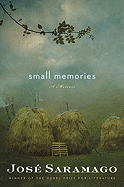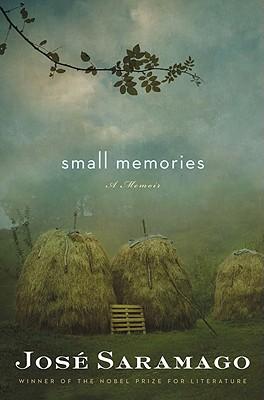
 Nobel
Prize-winner José Saramago could have found no more touching way to say goodbye
to his readers around the globe than this short, fragile, posthumous memoir. In
less than 140 pages, he re-creates growing up in the poor, rustic, ancient
Portuguese village of Azinhaga, where he was born and returned to frequently as
a child. In one profoundly touching vignette after another, he takes us back
through "the illegible pages of destiny," to a childhood of comically
mispronounced words and anatomy investigations with willing cousins, from
childhood nightmares to the thrill of first learning to read to the horror of
witnessing his father beating his mother.
Nobel
Prize-winner José Saramago could have found no more touching way to say goodbye
to his readers around the globe than this short, fragile, posthumous memoir. In
less than 140 pages, he re-creates growing up in the poor, rustic, ancient
Portuguese village of Azinhaga, where he was born and returned to frequently as
a child. In one profoundly touching vignette after another, he takes us back
through "the illegible pages of destiny," to a childhood of comically
mispronounced words and anatomy investigations with willing cousins, from
childhood nightmares to the thrill of first learning to read to the horror of
witnessing his father beating his mother.
Saramago, which means wild radish, was not a family name but a nickname by which his family was known in the village, made official by a drunk clerk at the registry office. That's just one of the old handed-down tales that Saramago loves. With stories peopled by his colorful family, from his hated great-aunt to the nocturnal rabbit stealer, he treats us to his very brief adventure hooking the biggest fish in the village's river; his constant battles with his cousin as they court the same girl; the penalty of trying to gorge on a bag of chocolates in bed and instead falling asleep on top of them. He veers effortlessly from the tragic death of his four-year-old brother back to the day his father asked his mother to be sweethearts and she forgot she was carrying a jug of water on her head.
His family survives in a world of barely enough money, stripped of luxuries like newspapers, where his parents pawn house blankets in the summer only to buy them back in cold weather. These are people with dried mud floors who scrub the steps of buildings or sell roasted chestnuts outside bars. We're back in the days when, instead of Santa, Baby Jesus came down the chimney at Christmas, no longer lying helpless in a manger but a proletarian worker, soiling his white clothes inside the sooty chimneys of the world.
The book abounds in poignant moments. Saramago's grandfather, a few days before his death, with a presentiment of mortality, embraces the trees in his garden, one by one, saying goodbye, thanking them for their shade and their fruit. His grandparents protect weak newborn piglets from the winter cold by taking them into their own bed.
With memory faltering as it tries to peer back at a foggy, distant childhood over 80 years ago, Saramago allows us to join him in savoring "the small memories of when I was small." Dipping into faded remembrances, not recalling their exact order, he frequently returns pages later to deepen them with new details, with "the courage to turn the coin over and show you the other side."
It's all gone now. The olive groves of his childhood have been torn down to grow hybrid corn. It's the rare reader who won't be near tears at the end of this too, too brief final work by one of the great literary masterminds of our century. --Nick DiMartino
Shelf Talker: A posthumous memoir by Nobel Prize-winner Jose Saramago, where he savors the memories of his childhood in profoundly touching vignettes.

